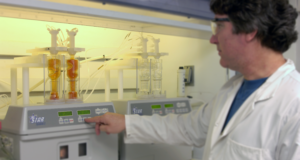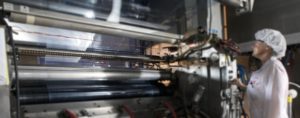Scaling Up Production: Determining Optimal Formula and Process Conditions
Precision, multi-layer solution coating processes are ideally suited for the manufacture of high-performance cast films, including polyurethane (PU) films. Solution casting a polymer dissolved in a solvent onto a temporary substrate has many advantages over the traditional extrusion of molten polymer through a die, including more uniform thickness distribution, higher dimensional stability and optical purity. Also, multi-layer coating processes enable the addition of functional coatings during the film casting process, eliminating the cost of secondary coating steps.
Scaling up production of a solution cast film is best done in a three-stage process: benchwork, pilot testing and full-scale production trials leading to process accreditation.
The Benchwork Phase

During the benchwork phase, a qualified contract manufacturer will work to understand the physical attributes of the materials to be cast as well as the functional attributes of the intended final product. The contract team will apply their knowledge of solvents, rheology and surface tension/energy to generate small sample films for customer review. For products with multiple layers, a series of samples may be produced to confirm details about each layer in the stack. From this early work, an initial project plan is devised. This plan outlines fluids and coating technologies for further evaluation.
Pilot Coater Trials
The product then scales up through a series of pilot coater trials as a range of solutions and conditions are tested. The resulting data is analyzed collaboratively to construct the best plan for subsequent trials.
Oftentimes, one or more Design of Experiments (DOE) is conducted to test formulation and structure options. DOE is a statistical method for identifying and understanding process factors that affect final product attributes. The data generated by the DOE is analyzed and used to help determine the proper machine settings for robustly reaching the final product specification. Information generated by DOEs can be used as a knowledge base from which engineers can predict the impact of changes in raw materials, formulation, and/or product specifications well after the initial product qualification.
Many times, customers use narrow-width pilot-cast films in test markets to confirm their product design before the project moves from pilot to large-scale production.
Full-scale Production
 With product design confirmed and process conditions identified through pilot coating trials, the project moves to the third step: full-scale production trials. During production trials, coating conditions developed on the pilot line are optimized for larger-scale mixing, casting and drying/curing equipment. Drying conditions are typically the most important factors to optimize when moving from pilot to production scale. One should gradually ramp the drying through the initial zones to remove the majority of the solvent, while avoiding surface skinning, especially for thick cast films. It is best to provide higher temperature and adequate residence time in the latter zones to remove residual solvent and adequately cure the film if needed.
With product design confirmed and process conditions identified through pilot coating trials, the project moves to the third step: full-scale production trials. During production trials, coating conditions developed on the pilot line are optimized for larger-scale mixing, casting and drying/curing equipment. Drying conditions are typically the most important factors to optimize when moving from pilot to production scale. One should gradually ramp the drying through the initial zones to remove the majority of the solvent, while avoiding surface skinning, especially for thick cast films. It is best to provide higher temperature and adequate residence time in the latter zones to remove residual solvent and adequately cure the film if needed.
After optimizing process parameters, the large-scale manufacturing process conditions are fully characterized with acceptable levels of variation for each process parameter. When all manufacturing process conditions are defined and documented, three separate casting events are conducted to ensure repeatable results before the solution casting process can be considered qualified/accredited.
In Summary
The solution cast film scale-up process described above, including benchwork, pilot coating trials and full-scale production trials, results in an optimized and well understood solution casting process, which delivers high-performance cast films.
Carestream Contract Manufacturing capitalizes on its precision coating technology and expertise to custom manufacture solution cast films for exacting markets. In Part 2 of this article series, we will detail in-line process control and quality processes, which enable continuous coating, while monitoring for and controlling process deviations that could have a negative impact on product performance.
Read Part 2 of this article, Working with a Manufacturer to Create Solution Cast Films Part 2, or visit the Boyd Technologies Sourcebook. View our Boyd Technologies Sourcebook Testimonial.
